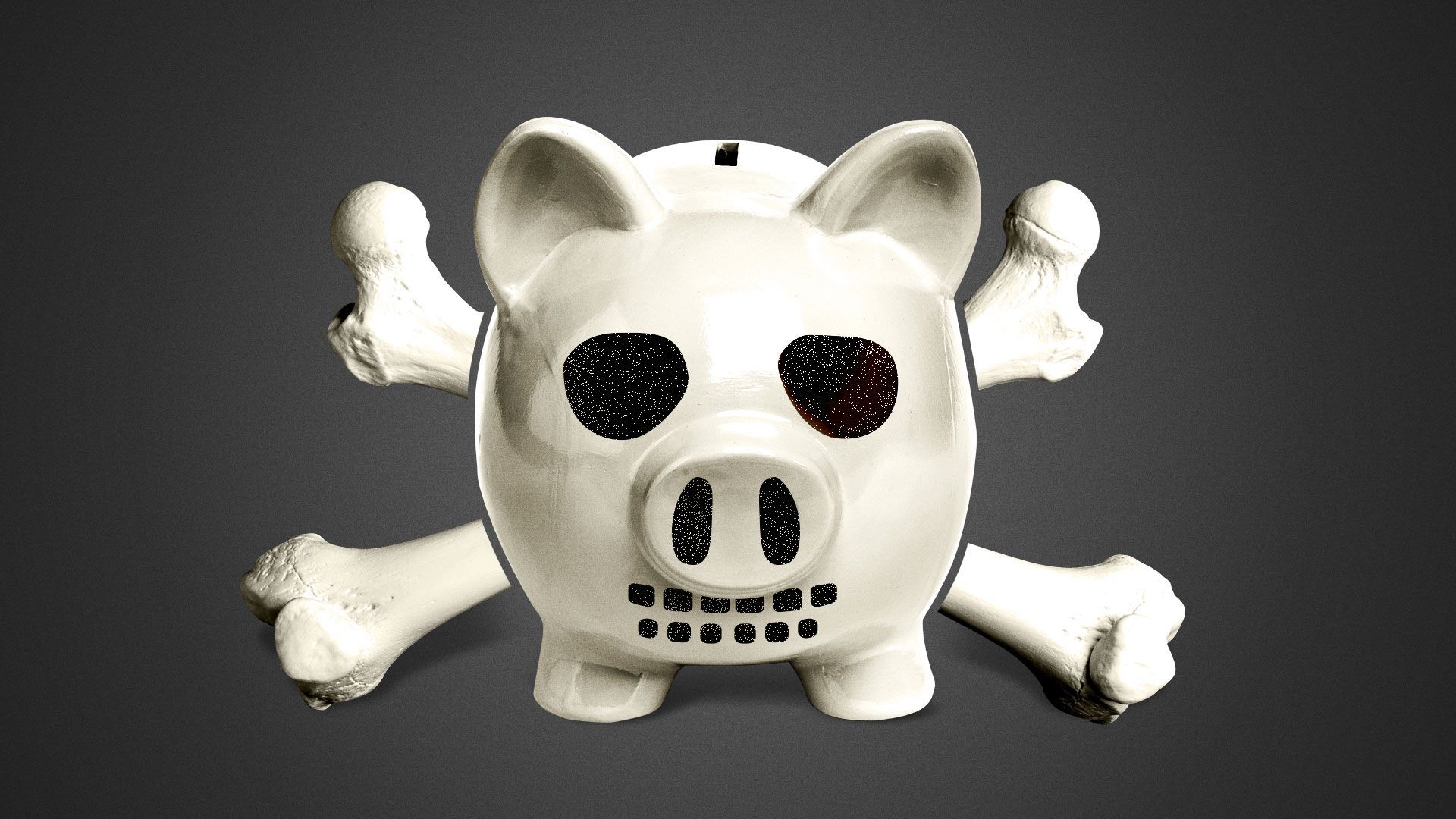Death spiral for consumers
Add Axios as your preferred source to
see more of our stories on Google.

Illustration: Eniola Odetunde/Axios
Despite some recent good news about dwindling household debt, the financial health of U.S. consumers is rapidly deteriorating — and families with children are faring the worst.
Why it matters: As Congress deadlocks over pandemic relief and President Trump issues executive orders of dubious potency, many Americans are suffering from a quintuple whammy: unemployment, overdue rent, mounting bills, food insecurity and health fears.
Where it stands: By some measures, we're doing quite well.
- People are paying off their credit cards at a surprising clip.
- Personal income grew in the second quarter of 2020 (thanks to hefty checks from the government).
- Investors are reveling in stellar market performance as the markets — somewhat jarringly — shrug off the dire economy.
- Total household debt fell in the second quarter of 2020 — the first time household debt has decreased since 2014.
But by more realistic and meaningful measures, people are in terrible shape.
- Joblessness remains "alarmingly high," as one NYT article describes it.
- Food pantries are overwhelmed. (Feeding America, which runs 200 food banks, says average demand is up nearly 60% and one in six Americans could face hunger as a result of the pandemic.)
- A massive wave of homelessness is starting to swell. ("Eviction cairns" are cropping up in New Orleans, where piles of people's belongings are being thrown out on the street.)
- People are even surrendering pets because they can't afford to take care of them.
How it works: Personal finance experts say the good-news indicators mask the true face of America's predicament.
- A lot of people were getting by on the extra $600 in their unemployment checks and $1,200 one-time relief checks.
- Now that those have expired — along with many eviction moratoriums — we're likely to feel the full force of the recession that started in February (just before the coronavirus pandemic hit).
What they're saying: "There are two Americas out there," Ed Mierzwinski, senior director of the federal consumer program at U.S. PIRG, tells Axios.
- "There are a lot of people who are just weathering the storm, hunkered down at home. And there are a lot of people who are getting paid less than they used to be paid, and they are painfully going through this pandemic economic crisis."
- Mierzwinski is part of a coalition of consumer advocates who are seeking to ban debt collection and negative credit reporting during the pandemic.
- He says he has seen "no empathy" from debt collectors (contrary to statements by the lending industry that they are being lenient).
- March, April, May and June saw a record number of complaints to the Consumer Financial Protection Bureau, per Mierzwinski. "There's going to be a cliff," he says.
Families are suffering the most. "What we see with households with children is that they're more likely to experience a job loss by somebody in the household, and they're more likely to experience a decline in overall income," Wilbert van der Klaauw of the Federal Reserve Bank of New York, tells Axios.
- Families with kids are also "more likely to report relying on food donations and financial support from friends, families and other social networks," van der Klaauw says.
- These conditions could have severe consequences for the children in those households.
There's "no indication that consumers expect the recession to end anytime soon," according to Richard Curtin, director of the University of Michigan Surveys of Consumers.
- "What people are believing now is they need more savings to hedge any future development in the pandemic," Curtin tells Axios — which is far easier for upper-income people than for low-income people who have lost their jobs.
- "Unfortunately, those most at risk have the least ability to save, and those who are least at risk have the most ability to save — and have saved."
People of color are at the greatest risk, says Thea Garon of the Financial Health Network, a clearinghouse for information on how consumers are doing.
The bottom line: Even if Washington does pony up more financial support for cash-strapped Americans, there's little hope for many people of long-term financial stability.
